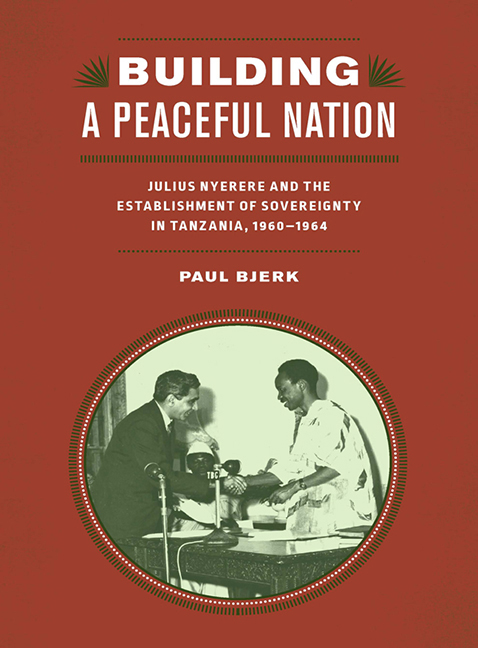 Building a Peaceful Nation
Building a Peaceful Nation Introduction
Published online by Cambridge University Press: 08 May 2021
Summary
The morning of Monday, January 20th, was grim and the hot heavy weather, without even a murmur of breeze, didn't help. It felt like the whole city was holding its breath waiting to hear what had happened. Nobody knew.
—Lady Marion Chesham, 1964A City of Rumors
On January 19, 1964, Tanganyika's president, Julius Nyerere, lingered at the statehouse, confident that the immediate crisis of the previous week's revolution in Zanzibar had passed. Most of his cabinet and several of the Zanzibari revolutionary leaders lounged on the terrace in the cool ocean breeze on this warm tropical evening. They drank beer, thinking big and making plans, the dream of revolution and the taste of freedom that it offered alive in their imaginations. “Nyerere seemed in no hurry to return to this pledge session and we talked for almost an hour.” He relaxed with Ambassador William Leonhart in the living room at the former colonial governor's mansion, sizing up the situation. They gossiped. Leonhart motioned through the terrace doors to the silhouette of self-proclaimed “Field Marshal” John Okello, the clueless young hero of the island putsch, who had been recruited into action by the Youth League of the fractious Zanzibari nationalist party, the Afro-Shirazi Party (ASP). In the clipped cadences of American diplomatic reporting, the ambassador narrated: “Asked Nyerere whether he was sane. Nyerere said yes. He quickly added that he had ‘no depth.’ He was ‘common policeman’ who had suddenly found himself in middle of Zanzibar situation and had no idea of what to do next. They would keep him in Tanganyika for a few days, cool him off, and try to give him some useful ideas.”
For all their fire and fearlessness, the Zanzibari revolutionaries, like new parents, suddenly had responsibilities. A little bewildered, they sought assurance from a trusted authority. They “kept turning to Tanganyika. Karume had been here once; Hanga, Babu and others several times during the week. They needed help, guidance, and emergency supplies.” Tanganyika under Nyerere had established an orderly government comprising Europeans, Indians, and Africans, its grassroots political party woven into local society throughout the nation.
- Type
- Chapter
- Information
- Building a Peaceful NationJulius Nyerere and the Establishment of Sovereignty in Tanzania, 1960–1964, pp. 1 - 20Publisher: Boydell & BrewerPrint publication year: 2015


